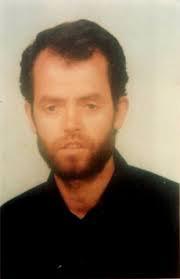
Lakhdar Bouzenia, aged 38 at the time, was a professor of Arabic literature at the Lycée Sidi Abdelaziz in the governorate of Jijel. He was a political figurehead for the Islamic Salvation Front (FIS), and was elected as a representative for Chekfa (Jijel) riding on 26 December 1991 during the first round of elections in which he earned 64.81% of the votes. The elections were then interrupted by a coup d'Etat on 11 January 1992.
Mr Bouzenia was arrested on 24 May 1993 at a police checkpoint in Al-Ancer, Jijel and detained incommunicado at Jijel military headquarters under the command of Commander Salah Lebbah, aka "Commander Belbah", where he was tortured by agents of the Department of Intelligence and Security (DRS) led by Captain Belkheir.
From the military base, he was transferred to the Territorial Center for Research and Investigation (CTRI) in Constantine directed by the Department of Intelligence and Security (DRS) and under the authority of the 5th Military Region of the People's National Army (ANP) which was under the command of General Abdelhamid Djouadi (1989 - May 1994).
During his detention, Mr Bouzenia was also held at various detention locations of the gendarmerie including those of Al-Ancer, Al-Milia, Settara and Al-Aouana. He suffered various forms of torture including "crucifixion". These acts of torture were carried out by members of the Gendarmerie Nationale, then under the command of General Benabbès Gheziel (1989 - March 1995), and which is a branch of the Ministry of Defense.
A month after his arrest he reappeared at Al-Milia court, where he was presented before a magistrate. During his appearance before the judge and in the absence of a lawyer, he could hardly stand. He was the shadow of himself due to the torture he had suffered: his hands and feet still bore the visible wounds of the "crucifixion" he endured during solitary confinement. Lakhdar Bouzenia was indicted for "the formation of and belonging to a terrorist organization", "endangering state security", "spreading seditious publications", "possession of firearms", "attacking the integrity of national territory " and " conspiracy ". Neither any proof, nor any physical evidence was ever presented by the prosecution during the trial.
Lakhdar Bouzenia was then incarcerated at Jijel prison and held in solitary confinement until 27 October 1993, when he was transferred to Constantine prison pending his trial scheduled for 17 November 1993. During this period his family was able to visit him several times and was thus able to ascertain information regarding the acts of torture he had suffered.
After a transfer order was signed by the Attorney General of Jijel, Mr Bouzenia was supposed to be transferred alone, in a patrol wagon and escorted by vehicles of the Gendarmerie Nationale, to Constantine prison. The convoy left Jijel detention center on 27 October 1993 at 11 am but Constantine prison administration said that he was never admitted. Mr Bouzenia has therefore been disappeared from the time the van left at Jijel detention center on 27 October 1993 at 11 am.
Newspapers on Sunday, 31 October 1993 published reports that the Algerian security forces had eliminated 11 terrorist on Wednesday, 27 October 1993, including a person named Lakhdar Bouzenia. On the same day, public television stations hailed the liquidation of the "terrorists" as an achievement for the Algerian army. Mr Bouzenia's family initially thought it was someone with the same name, as the victim in this case was supposedly in custody of the security services at the time of the event.
On the day of Mr Lakhdar Bouzenia's trial, 17 November 1993, the President of the Special Court of Constantine, once noting his absence, took the prosecuting attorney aside and after a short deliberation, pronounced "the cancellation of public action because of the death of the accused, Lakhdar Bouzenia."
Mr. Bouzenia's family undertook every possible administrative and judicial action in order to obtain information regarding the circumstances of his disappearance - they even asked for an official confirmation of the identity of the man who had been slaughtered in order to determine that it was not their father - yet to no avail.
Between 1993 and 1998 between 8,000 and 20,000 people, according to sources, were arrested or abducted by Algerian security forces - every security body has been implicated, included militias armed by the government. These arrests and disappearances took place following the coup on 11 January 1992. Those responsible for these disappearances have never been prosecuted or punished; in the aftermath, many of them, especially senior army officials, have been promoted to the rank of General or Major General by President Bouteflika.
Since the 2006 promulgation of the order for implementing the Charter for Peace and National Reconciliation, all complaints regarding disappearances are inadmissible in Algeria. Left with no choice, Mr Lakhdar Bouzenia's family addressed the UN Human Rights Committee with its complaint on 8 January 2010. The UN body has been asked to note that the arrest, torture and disappearance of Mr Lakhdar Bouzenia violate the International Covenant on Civil and Political Rights ratified by Algeria in 1989.
